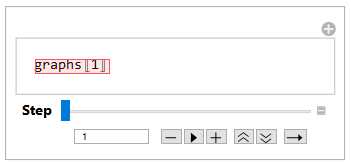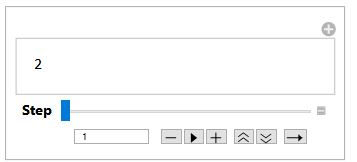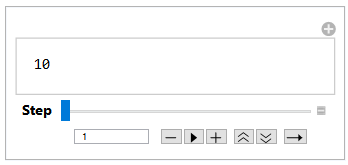I have an array named graphs which was calculated during a longer program. Actually, this is an array of Graphics like frames of a video, but here I just use a simple array with numbers. I want to show the array elements with Manipulate and possibly run them like a film.
Case 1: In the first naive approach, I just call Manipulate with the array and a StepManipulator-control for the frame number. The two symbols graphs within Manipulate are unevaluated or respectively unknown and highlighted red with a warning "'graphs' in ... occurs where it is probably not going to be evaluated before going out of scope". Obviously, the graphs within the Manipulate is not the same as outside.
Clear[graphs];
Block[{graphs = {1, 20, 30, 40}},
Print[Manipulate[
graphs[[i]]
, {{i, 1, "Step"}, 1, Length[graphs], 1, Appearance -> "Open"}
, LabelStyle -> Directive[Black, Bold, 11],
ControlPlacement -> Bottom
]];
];
 graphs graphs
graphs graphs
Case 2: In the second approach, I add an option SaveDefinitions -> True. Highlighting and warning remain, but now graphs takes on its proper value. And when it is changed at the beginning of the Block, this is reflected within Manipulate after the block is evaluated.
But graphs changes as well within the Manipulate in Case 1 above! Even when I reevaluate Case1 it does not get back its proper Case 1 value. Obviously, the SaveDefinitions has turned graphs into a global variable and the definition within Block is ignored.
(* Case 2 *)
Block[{graphs = {2, 20, 30, 40}},
Print[Manipulate[
graphs[[i]]
, {{i, 1, "Step"}, 1, Length[graphs], 1, Appearance -> "Open"}
, LabelStyle -> Directive[Black, Bold, 11],
ControlPlacement -> Bottom
, SaveDefinitions -> True
]];
];

graphs
{2, 20, 30, 40}
The documentation says "Manipulate is a scoping construct that implements lexical scoping" which might explain some of that unexpected behavior. But why does Case 2 work then? How does the outer graphs-value from Block get into Manipulate?
Anyway, I do not like that SaveDefinitions-option since it is needless and may lead to a huge notebook on disk.
Case x: I tried some other things with accessing graphs trough a trivial function defined inside or outside Manipulate. But this doesn't change anything.
Case 10: What works is to use an intermediate global array globGraphs fed from graphs.
(* Case 10 *)
Clear[globGraphs];
Block[{graphs = {10, 20, 30, 40}},
globGraphs = graphs;
Print[Manipulate[
globGraphs[[i]]
, {{i, 1, "Step"}, 1, Length[globGraphs], 1, Appearance -> "Open"}
, LabelStyle -> Directive[Black, Bold, 11],
ControlPlacement -> Bottom
]];
];

{graphs, globGraphs}
{{2, 20, 30, 40}, {10, 20, 30, 40}}
Now I have no highlighting and warnings anymore and everything works as expected. But that solution looks pretty strange.
Does anybody have a better solution?
 Attachments:
Attachments: